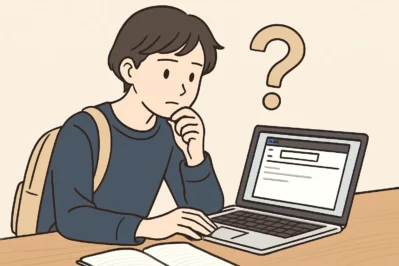Professor, I Have a Question! Your Guide to Perfect Korean Emails
Hello! This is Maeil Hangeul, here to upgrade your Korean skills!
Are you studying at a Korean university? Ever felt nervous about how to ask your professor a question over email? You’re not alone! Knowing how to write a formal email is a super important skill for a successful school life in Korea.
Lately in Korea, with more and more international students arriving, a hot topic in online communities is how to navigate the formal academic culture. Writing a proper, respectful email is a huge part of making a great impression. So today, let’s learn the key phrases to write to your professor like a pro!
Core Expressions You Must Know
Here are the essential building blocks for your email.
1. 교수님께 (Gyosunim-kke)
* Pronunciation: [Gyo-su-nim-kke]
* English Meaning: To the professor
* Detailed Explanation: This is the standard, formal way to address your professor at the beginning of an email. 교수님 (gyosunim) means “professor,” and the particle 께 (kke) is a highly respectful version of “to” (like 에게/한테). Always use this to show respect!
2. [수업 이름]을/를 수강하는 [이름]입니다. ([Sueop ireum]-eul/reul suganghaneun [ireum]-imnida.)
* Pronunciation: [Su-eop i-reum-eul su-gang-ha-neun i-reum-im-ni-da]
* English Meaning: This is [Name], who is taking your [Class Name] class.
* Detailed Explanation: Your professor likely has hundreds of students. This phrase is the most polite and efficient way to introduce yourself. 수강하다 (suganghada) means “to take a course.” Remember to use 을 if the class name ends in a consonant (e.g., 한국어학을) and 를 if it ends in a vowel (e.g., 한국사를).
3. …에 대해 질문이 있어 연락드렸습니다. (…e daehae jilmun-i isseo yeollak-deuryeossseumnida.)
* Pronunciation: […e dae-hae jil-mun-i iss-eo yeol-lak-deu-ryeot-seum-ni-da]
* English Meaning: I am contacting you because I have a question about…
* Detailed Explanation: This is a clear and polite way to state your purpose. You place the topic you have a question about before the phrase (e.g., 과제에 대해... for “about the assignment…”). The verb 드리다 (deurida) is the humble form of 주다 (juda), making 연락드렸습니다 (I contacted you) sound very respectful.
4. 안녕히 계십시오. / [이름] 올림 ([Ireum] ollim)
* Pronunciation: [An-nyeong-hi gye-sip-si-o] / [[Ireum] ol-lim]
* English Meaning: Goodbye. / Sincerely, [Name]
* Detailed Explanation: 안녕히 계십시오 is the most formal way to say “goodbye” in writing. For the sign-off, [이름] 올림 is a traditional and very respectful closing. 올림 (ollim) literally means “to raise up” or “to offer,” showing that you are “offering” the letter to someone of higher status. It’s the perfect formal sign-off for a professor.
Example Email
Let’s see these phrases in action! Imagine a student named Jane is emailing Professor Kim about her Korean History class assignment.
Subject: [한국사] 과제 관련 질문입니다 (제인)
([Korean History] Question regarding the assignment (Jane))
Body:
김민준 교수님께,
안녕하세요, 교수님.
한국사 수업을 수강하는 제인입니다.
다름이 아니라, 다음 주 과제에 대해 질문이 있어 연락드렸습니다.
과제 마감일이 정확히 언제인지 다시 한번 확인해 주실 수 있을까요?
답변 기다리겠습니다.
감사합니다.
안녕히 계십시오.
제인 올림
Culture Tip & Trend Deep Dive
In Korea, showing respect (예의) in communication is extremely important, especially in an academic setting. It’s not just about the words you use, but how you use them.
- The Subject Line is Key: Lately, Korean students on university forums have been sharing tips, and a common one is about the subject line. Avoid casual greetings like “안녕하세요!” Instead, make it clear and professional:
[Class Name] Your Topic (Your Name). This helps the professor immediately know who you are and what the email is about. - Timing Matters: To show extra respect for your professor’s personal time, try to send emails during normal working hours (e.g., 9 AM – 6 PM on weekdays). While not a strict rule, sending an email at 2 AM might be seen as a little inconsiderate. Following this small custom will make you look like a culturally savvy student!
Let’s Practice!
Time to check your understanding! You need to email Professor Lee about your “Modern Korean Literature” (한국 현대 문학) class. Fill in the blanks.
- 이민호 교수님______,
- 안녕하세요. 한국 현대 문학 수업을 _________ 마이클입니다.
- 기말고사에 대해 질문이 있어 ____________.
- 마이클 _____
Great job today! Learning these small details will make a huge difference in your life as a student in Korea.
Now it’s your turn! Try writing a short, simple question for your imaginary professor in the comments using the phrases we learned today!






